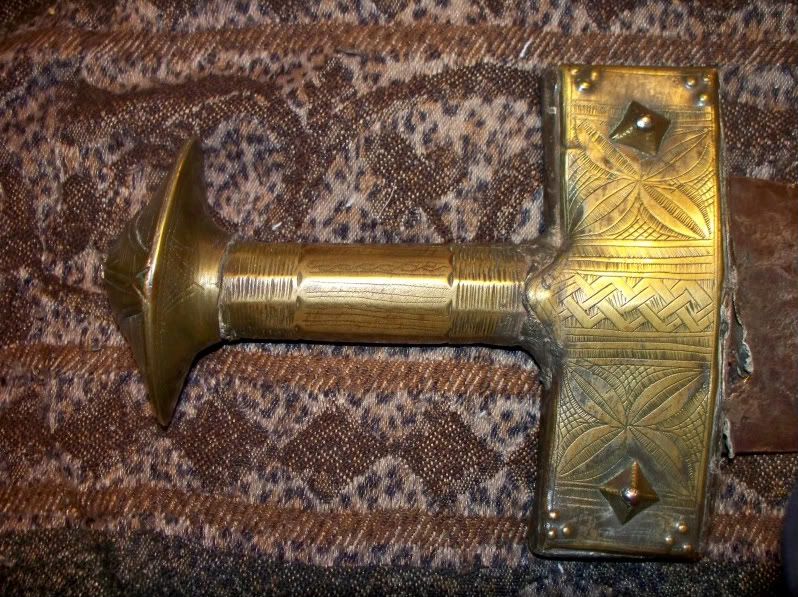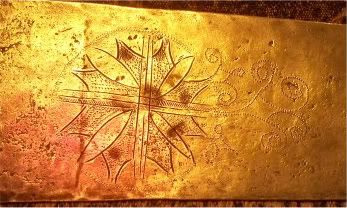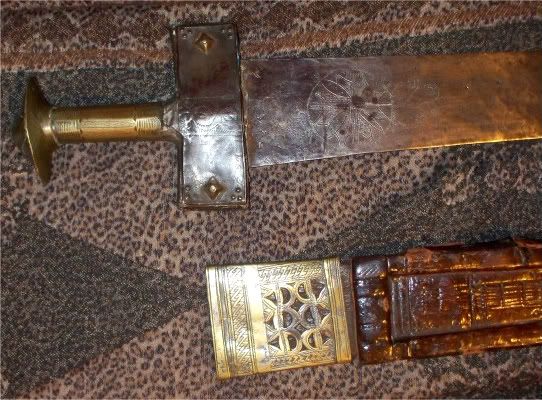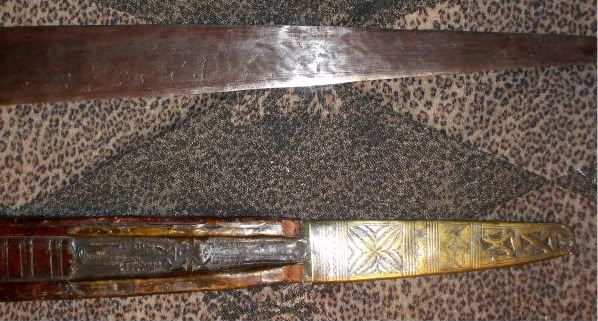
 |
|
|
#1 |
|
Member
Join Date: Dec 2004
Location: Inland Empire, Southern California USA
Posts: 160
|
This is a Southern Style Takouba I believe.
Interesting motif on the blade. Also on back of hilt. Any meaning to it? Date?     
|
|
|

|
|
|
#2 |
|
Member
Join Date: Mar 2010
Location: Olomouc
Posts: 1,693
|
Nice piece in my favorite style! Almost certainly Hausa manufacture based on the motifs. Date, I'd say conservatively anywhere from mid 1800s to turn of the century. Maybe optimistically a bit older, but there's no set in stone dating method for these.
I usually term these wide-bladed takouba and they seem to turn up most frequently among the Hausa, almost always with these fairly flat profiled blades. However I would imagine yours has good flex and overall decent quality steel. The motif on the blade is very intriguing, I've seen similar designs placed on hilts but not on the blade directly. As for meaning, I'm not sure of anything direct, but my current belief and theory is that a lot of these takouba decorations are rooted in Hausa architectural motifs. For a similar piece of mine you can look here: http://takouba.org/takouba16/ Overall a lovely Hausa takouba and something I would give a good home and much pampering should you ever decide to part with it.  (i.e. I'm jealous (i.e. I'm jealous  ) )
|
|
|

|
|
|
#3 | |
|
Member
Join Date: Dec 2004
Location: Inland Empire, Southern California USA
Posts: 160
|
Quote:
 This place is invaluable. I'm finding Facebook is good as well. People can build a photo cataloge of their collection and friends, other collectors, can comment and help one learn. Thanks for the referal to the Takouba Research Society. Your piece is just like mine, nice. Part of the guard on mine pealed up a little. Its is very soft metal like lead. What do you think, did they use lead? Guess I better get reading on the research site. Thanks again. This place is invaluable. I'm finding Facebook is good as well. People can build a photo cataloge of their collection and friends, other collectors, can comment and help one learn. Thanks for the referal to the Takouba Research Society. Your piece is just like mine, nice. Part of the guard on mine pealed up a little. Its is very soft metal like lead. What do you think, did they use lead? Guess I better get reading on the research site. Thanks again.-Stephen* Last edited by Nagawarrior; 26th January 2011 at 12:29 AM. |
|
|
|

|
|
|
#4 |
|
Member
Join Date: Mar 2010
Location: Olomouc
Posts: 1,693
|
Hi Stephen,
If it's an Eric from France I just might. It is a small world indeed for these, thankfully getting ever smaller as there are more than enough mysteries still to solve about these swords! These hilts are usually made in more or less the following manner:
Depending on the age of the piece there may or may not be re-enforcing rolls of metal inside the grip. Everything is soldered together (so yes, lead is there). Of course this applies to Hausa pieces, I've seen and had a few pass through my hands with solid cast hilts but the general opinion is usually for a more West African attribution on those. If you care to have your sword displayed on my site I'd be more than happy to have it up there. Really an excellent example with some fairly unique features. It's getting harder and harder to find ones like yours - with nice fittings and the older native blades, congrats again. |
|
|

|
|
|
#5 | |
|
Member
Join Date: Dec 2004
Location: Inland Empire, Southern California USA
Posts: 160
|
Quote:
-Stephen* |
|
|
|

|
|
|
#6 |
|
Arms Historian
Join Date: Dec 2004
Location: Route 66
Posts: 9,945
|
Beautifully done on the assessment on this Iain, reflecting the outstanding core of knowledge you have brought to us regarding these fascinating Saharan weapons. What always truly amazes me is just how widely the 'West African' sphere extends into the Sahara, often linking the weapons of the west to those deep in Saharan and Sahelian regions, far from the 'coastal' associations often implied to West African attribution.
It seems interesting also that these geometrically based motif, in tribal concept especially with the cross or quadrefoil type floral, usually reflect the four cardinal directions, key in tribal folk religion and lore. The intermediate or superimposed petals or lines suggest subordinate directions also. The entwined feature also has many significant interpretations. I think one of the best books I have seen that illustrates and describes many features of the motif in African art and jewellery is "Africa Adorned" by Angela Fisher. The author has most impessive knowledge of many facets of the motif, such as the Agadez Cross and many others, with a wonderful and colorful presentation. Thank you Stephen for posting this beauty!!! and Iain, as always for your outstanding insight. All the best, Jim |
|
|

|
 |
|
|